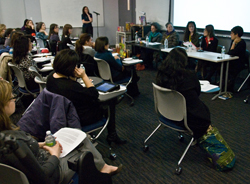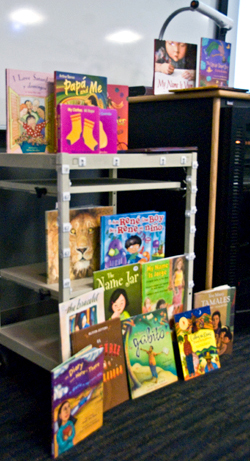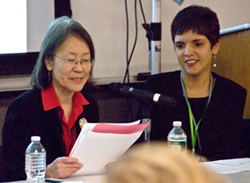Debunking the Myths of Multilingualism
A panel of TC faculty members take on some common hopes and fears
Myth, says Celia Genishi, Professor of Education. In reality, kids make “sociolinguistic choices”; witness her own story. Genishi spent part of her youth in a Japanese internment camp during World War II, where her parents spoke Japanese with their friends. As she grew older, however, Genishi felt embarrassed when she used Japanese words with her peers. She rejected the language, even though it had surrounded her from her earliest days.
Bi- and multilingualism seem to inspire mythmaking, perhaps because they break down traditional (and, for some, reassuring) barriers between people. At the panel at which Genishi and several other TC faculty spoke in mid-February—“Bi- and Multilingualism in Young Children: Supporting Families, Cultivating Linguistic Diversity”—several other myths were debunked.
One was the notion that multilingualism leads to language delays. Children learning multiple languages may, in fact, take a bit longer to start speaking, but often their grasp of linguistic principles is more sophisticated once they do begin speaking. Meanwhile, “some children have disabilities and they are bilingual but it is not caused by the bilingualism,” said Patricia Martinez-Alvarez, Visiting Assistant Professor of International and Transcultural Studies, adding that a true disability will show up in both languages.
In fact, multilingualism is associated with certain cognitive benefits, such as better executive control, divergent thinking, and communicative sensitivity (the ability to understand the needs of the listener). Multilingual people do have more “tip-of-the-tongue” moments, searching for the right word, but that’s because they have more words to process.
Another myth: the idea that “code mixing”—changing from one language to another within the same utterance or written text, a common practice in societies in which two or more languages are used—is a sign of linguistic confusion. In fact, said Maria Souto-Manning, Associate Professor of Education, children use all the language at their disposal to make sense of the world around them. Code mixing can be very rich, linguistically, and is often quite grammatical.
And still another myth: Even if bilingualism has benefits, it will hamper English language learning. In fact, said Maria Torres-Guzman, Professor of Bilingual Education, there are no studies proving that knowing another language harms English acquisition. The real problem is inconsistency; if a child’s schooling isn’t consistent, he or she will have a hard time learning English. In addition, children who are not native speakers may have difficulty functioning when academic English is used, because they encounter words that have not previously come up in every day use. Adults who are aware of this difference can help children acquire the vocabulary they need. And if students have a strong foundation in one language, they will eventually be able to transfer those skills to a second language.
Tori Hunt, Instructor of Curriculum & Teaching, was the only person on the panel raised in an English-only household, and she agreed with the others that multilingualism is a gift, not a liability. “I felt like I was at somewhat of a disadvantage because I was never given a second language,” she recalled. “So I have dragged my children every Saturday to Chinese class.”
All of the panelists stressed the importance of giving children opportunities to use their languages while understanding that they may not embrace a language in the way their parents want them to. Some children will refuse to speak in a different language with a parent they know speaks English. One solution in that situation, Torres-Guzman said, is “the grandmother effect”: interactions with relatives who only speak the other language.
That observation brought the conversation full circle to Genishi. Children, she said, are “agents in charge of their own language stories.”
Published Tuesday, Mar. 29, 2011


